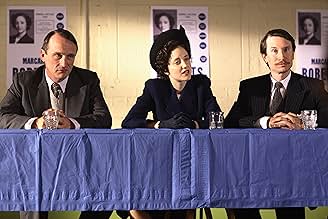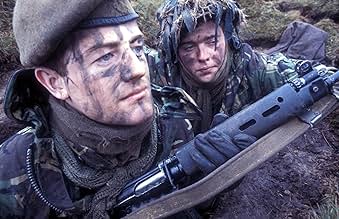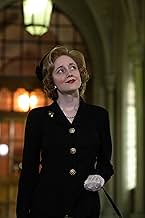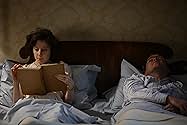Agrega una trama en tu idiomaOn April 2, 1982, Britain went to war to regain the Falkland Islands. This movie is a gripping account of how Prime Minister Rt Hon Margaret Thatcher MP's government handled the biggest cris... Leer todoOn April 2, 1982, Britain went to war to regain the Falkland Islands. This movie is a gripping account of how Prime Minister Rt Hon Margaret Thatcher MP's government handled the biggest crisis in British foreign affairs since the Suez Canal. It tells the story of how Argentina, a... Leer todoOn April 2, 1982, Britain went to war to regain the Falkland Islands. This movie is a gripping account of how Prime Minister Rt Hon Margaret Thatcher MP's government handled the biggest crisis in British foreign affairs since the Suez Canal. It tells the story of how Argentina, an ally of the British, fought the Conservative government and invaded the Falklands. This ... Leer todo
- Dirección
- Guionista
- Elenco
- Dirección
- Guionista
- Todo el elenco y el equipo
- Producción, taquilla y más en IMDbPro
Opiniones destacadas
Within minutes I knew this is great TV. Who cares if shows the Rt Hon Margaret Thatcher as a great PM or not. The acting is what I was watching Patricia Hodge is just so good at Playing Maggie & as for Shaughan Seymour as Adm Sir Henry Leach is he a good actor or is Carrie Hilton, Casting Director one of the greats or maybe Michael Samuels the Director who knows how to get the best out of the actors or just maybe all three.
I am waiting for this to come out on DVD. I will buy it, great viewing great acting.
Ohh how lucky was I again, this was on on Friday 8 th March 2006 & this time I had the VRC ready. It was just as good as the 1 st time I watched it, no that is wrong, it was better, I have seen it twice since Friday, there are bits I never noticed the 1 st time & not even the 2 nd time. I can only say again what great TV & so well acted.
Thank you BBC 4 for showing this.
Update March 2007 now on DVD & yes i have bought a copy.
I have since bought "An Ungentlemanly Act" on DVD, great well worth the £4.99p from Play.com.
As noted by a reviewer above, Thatcher's political position was very weak at the time. She was seen by the country and many of her "wet" cabinet ministers as being a right wing liability who would sink the Tories at the next election because she had worsened, not improved, Britain's economy. Unemployment had sky-rocketed.
The decision to withdraw HMS Endeavour from the South Atlantic (the supply ship for the Falklands) was made by her right wing Defence Minister John Nott on grounds of cost- cutting. Both the Foreign Office under Carrington and I believe the Chiefs of Staff and the Intelligence Services opposed it on the grounds that the Argentinians would interpret the withdrawal as a sign that the UK was not serious about maintaining its Falklands colony and this would greatly encourage them to invade. Thatcher overruled them and backed Nott. She therefore had direct responsibility for this mistaken decision and should, on the Argentinian invasion, have resigned.
This was known at the time of the Saturday House of Commons debate by many people, especially on the Conservative back benches. There was great unease on them, and talk of replacing her. What saved her probably was Michael Foot's highly patriotic support of her in his speech and the fact that the debate only lasted 4 hours rather than the more usual 8. (Clever work probably by the Whips). If it had been 8, it is very likely that this unease about Thatcher would have surfaced from both wets and right wingers who suspected she was an incompetent woman who had blundered into a war.
Then, had she been replaced - probably by a wet ("wets" by and large were of an older generation than the supporters of Thatcher and had fought in the 2nd War and would have been thought "reliable" to fight another war) - the war would have gone ahead, Britain would again probably have won, and a "wet" rather than Thatcher would have been in charge of Britain and subsequent history would have been radically different. But it is through ironies like this that history operates. As it was, it was those who had been originally been right on "Endeavour" who were forced to resign like Carrington, and Thatcher, the British politician (along with Nott) most responsible for allowing the war to break out, the person who went on to be lionised as a great Churchillian war leader.
The Saturday Commons debate was the great turning point. Curteis presents the debate falsely as a straight patriotic piece of Churchillian stiff upper-lip tub thumping. (This is understandable, the Left had been and was caricaturing Thatcher mercilessly in their propaganda and Curteis's play is his right-wing propaganda blast back). But it would have been far more interesting - and dramatic - to go for neither villains or heroes, but what history really consists of - human beings. And by showing complexities and ironies, rather than pieties and propaganda.
The acting is of the highest order...... you truly believe that these are the people, and this is how they behaved (Hodges Thatcher is remarkable). Add this to a plot that fiction could never match, and you are likely to be hooked from the opening scene.
With caution, I would also suggest that this drama does bring history to the viewer, in a way the BBC seems to constantly excel at. Much of the script is taken from hansard (parliamentary transcripts), contemporary diaries, and news reports..... the drama didn't need to be invented.
One or two earlier reviewers felt that it was a historical distortion, however, in my opinion, they are still grinding axes.
So yes.... do bear in mind that in the years running up to the crisis, perhaps the Brits took their eye off the Falklands (though this is outside the remit of this play).
Also yes.... there was the major incident 'sinking of the Belgrano', that in real life, was controversial. However, I believe the play portrayed the genuine view of the decision makers: 'destroy it, before it destroys us'.... a view held by the majority of the UK population (I would suggest).
As for the suggestion that 'Thatcher would never have ranted against Argentina to the US', I find beyond belief. That's exactly how she behaved, and she was famous for it AND by the way, it is portrayed marvelously in this play, with the joy of historical posturing so well done.
If you get the chance...... watch it!
Britain won the little but costly war and Prime Minister Margaret Thatcher emerged he winner. She was a hard charger and much admired for it. Of course if the victory had been the other way round, a lot of people would be dead for little reason and she would be thrashed. As it was, there was no stopping her in her determination. One American consultant muses, "I wish there were more like her. You always know exactly where you stand." "In the corner," replies another.
There is very little footage of the war itself. The script seems to jump from the landings of the British SAS to the surrender of the Argentinian soldiers. But that's okay because this is, after all, a play, not a big budget feature film. Besides, the general outline of the war's progress is already familiar to some viewers, although by no means all of them. Anyone interested in the engagements should be directed to the concise documentary, "20th-Century battlefields: 1982 The Falkland Islands War." It can be viewed free on YouTube.
The script has sufficient continuity so that we can follow events as they unfold, even though we're confined mostly to a few rooms and a handful of other sets. As Thatcher, Patricia Hodge is quite good, if lacking in heft. And there isn't a dull bulb among the supporting actors. There are a few moments of humor. Someone tells the Defence Minister, Clive Merrison, that this is the first time a British fleet has set sail for an attack since Suez. Merrison replies slowly and deliberately. "Can we keep Suez out of this conversation? Those are two little words that -- irk." The well-meaning Americans provide some ludic relief as well. Thatcher invites the American consultants to dinner and takes aside Alexander Haig, the Defense Secretary before they sit down. Thatcher shows him a large painting of two men -- the Duke of Wellington and Lord Nelson, saying that they were two heroes who put an end to willful aggression by dictators. "I thought you might want to look at them during dinner." Haig mutters into his drink, "Gee, thanks."
The role of the Americans is that of a nation full of good will, anxious to avoid bloodshed, and apparently oblivious to the fact that Argentina is under the thumb of a brutal military junta who has invaded the Falklands -- which they (still) insist on calling Las Malvinas -- in order to distract the population from the catastrophic conditions at home. Haig is a good guy, although ineffective. President Reagan's attitude was that "both of them are our friends," even after the British ambassador reminds him that Britain didn't hesitate for a moment to aid in the extraction of 52 hostages after the embassy takeover in Iran.
Reagan apparently listened less to Haig than to his UN ambassador, Jeanne Kirkpatrick. Kirkpatrick was a pragmatic and ardent anti-communist. As Wikipedia puts it, "She was known for the "Kirkpatrick Doctrine", which advocated supporting authoritarian regimes around the world if they went along with Washington's aims. She believed that they could be led into democracy by example." Argentina fell into that category.
Reagan himself thought it a minor matter, calling them "bleak little islands" and never quite remembering their name. After the British victory, Reagan called on Thatcher to be "magnanimous," and Thatcher blew him off. By the time the war had begun, however, the US came around and placed an embargo on shipments to Argentina and agreed to supply Britain with whatever materiél it required.
Whatever else this fine program does, it illustrates the way that democracy is supposed to work, and of course it will be informative to those whose memories don't extend very far into history.
Originally written by Ian Curteis shortly after the war ended but the BBC declined to produce it, officially because it wasn't good enough, but widely believed to be because it was too pro-Conservative just before a General Election in the UK. Watching it now it's even harder to believe that it wasn't good enough to make years ago.
Telling the story of the British politics immediately before and during the conflict Patricia Hodge is brilliant in her role as Mrs. Thatcher. So scarily like her that during the recreated news clips it's hard to remember which one is the actress. Although some of the other lead characters look and sound nothing like their alter-egos, they still manage to recreate the right atmosphere.
Deliberately supposed to show the conflict from `our side' I'm not sure if the emotional side of Margaret Thatcher isn't over played slightly.
¿Sabías que…?
- TriviaOriginally commissioned by the BBC in 1987, but wasn't filmed until 2002.
- ErroresAdmiral Lewin is wearing the South Atlantic Medal. Before the war had even begun.
- Citas
[in a War Cabinet meeting]
Margaret Thatcher: Do we send those ships? Do we still have the will to fight aggression by force of arms, even halfway across the world, even at huge risk of world opinion turning against us? Because if we don't have it any more, for God's sake say so now and pull out before we start. It may be we *are* going to war. People *will* get killed. Innocent people. Young soldiers, many of whom won't even know what it is we are fighting for. Are we really prepared to do that? Do we still believe what we certainly believed in in 1940? Or is that now just the romance of history, nothing to do with the cold reality of Britain in 1982, part of a nation that has, actually, quietly died, as Greece died, as Spain died? Because if in our hearts we really believe that Britain is dead, then it would be a crime of the direst and blackest sort to send those men to fight, a crime of which the country would very soon find us guilty, because their hearts won't be in it. The first death will light the fuse that will blow us sky-high and clean out of office at the next election. Now, do we send the signal or not?
[each cabinet minister, with some hesitation, says "yes"]
- Créditos curiososThe first names of Nicholas Ridley and Jeanne Kirkpatrick were mis-spelled as Nicolas and Jeane in the closing credits.
- ConexionesFeatured in When TV Goes to War (2011)


































